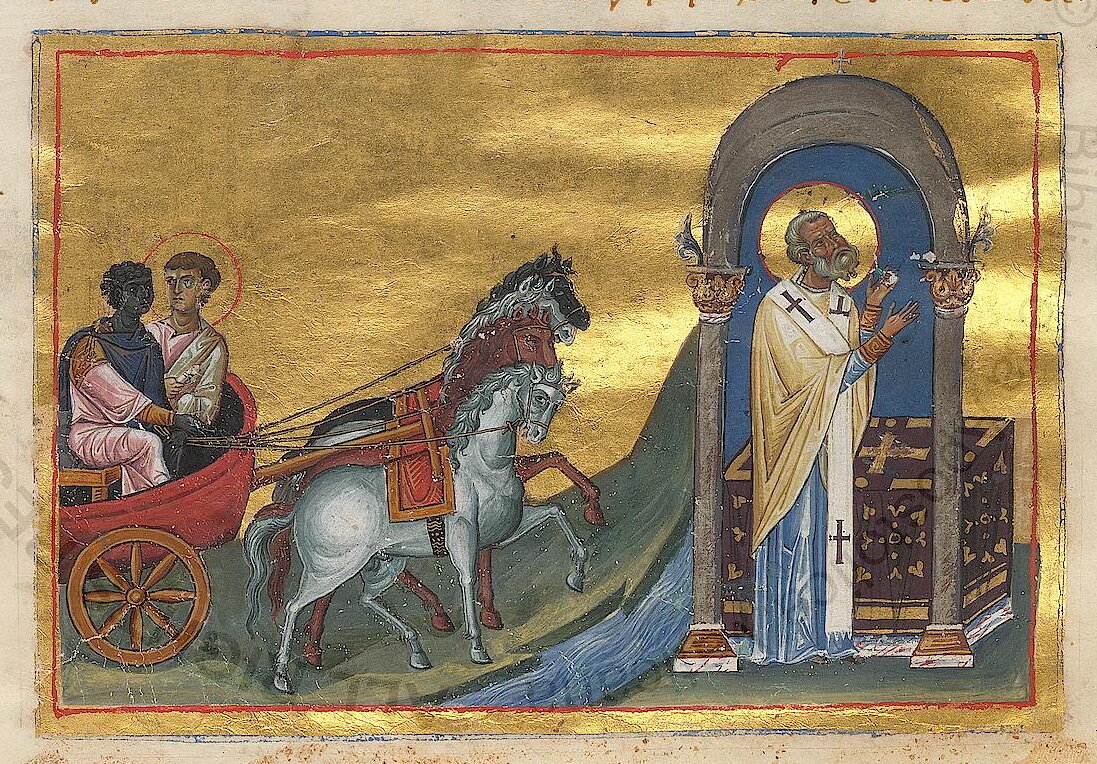Narrative Lectionary Program Year – Ethiopian Eunuch Baptized
Acts 8.26-39
Free Additional Resources for Study & Sermon Preparation
Furthering the Power of God’s Story – Narrative Lectionary Commentary
by Rev. Dr. Clint Schnekloth
We can consider this literally an intersectional text. At the very least, we have a non-binary black man traveling between Israel and Ethiopia reading a religious text not of his own tradition.
When Professor Kimberlé Crenshaw coined the term in an academic paper 30 years ago, it’s unlikely she had this specific passage in mind. She was looking at power imbalanced in the legal system that resulted from the intersection of race and gender.
But once we are aware of the intersectional analysis, it’s difficult not to consider this narrative in such a manner. If we do, we see right away that the Ethiopian eunuch exists at some very queer intersections. Literally.
He presents as gender non-binary, something relatively unknown in Israelite and Roman culture but more common in his home culture. This both removes him from typical status but also elevates him in another way. He’s clearly a eunuch of means.
As a traveler in Israel, he’s clearly not a refugee. There isn’t vulnerability in the way many foreigners would be vulnerable in a nation not their own. And yet he’s also not a part of the culture of Israel.
That being said, he is very curious. He’s reading the sacred texts of Israel. And he’s doing so not just out of intellectual inquiry, but genuine religious curiosity that leads him to join the faith he is inquiring into.
By being baptized, he becomes in a way less Ethiopian and now part of a new religious movement altogether, one that had historical origins in a form of religiosity that was itself uncertain about the place of Gentiles within it.
Intriguingly, Philip seems to take almost all of this in stride. There’s something about the new life in the Spirit, a new life we’ve been slowly learning as we read Acts as a whole, that prepares Philip to take this whole moment not as marginal or distracting, but rather as crucial and transformative. The two intersect briefly, the promises attending baptism are made and the water engaged, and then the two are whisked away to continue their work.
“Intersectionality operates as both the observance and analysis of power imbalances, and the tool by which those power imbalances could be eliminated altogether. And the observance of power imbalances, as is so frequently true, is far less controversial than the tool that could eliminate them.” Certainly, the elimination of power imbalances will need to continue in the church in Israel, and the new church formed under the eunuch’s influence in Ethiopia. But the intersectional nature of the gospel has, in this event, been enacted.
Menu
The following links and resources are not produced or maintained by Clergy Stuff. However, at the time of this posting, the links were active and considered to be good source material for proclamation for the text for this week. Please scroll down or click on the quick jump menu you find below. For more free worship resources & planning materials, please visit our links for RCL Worship Resources.
Other Resources
Exegetical Links
Was Jesus Intersex? by Clint Schnekloth
Philip and the Ethiopian Eunuch, by Kittredge Cherry
Philip, the Ethiopian Eunuch, You and Me, by Stephanie Spellers
Intersectionality, Explained, by Jane Coasten
Great Quotes
“What prevents me from being baptized?”
“ “This man (Simeon Bachos the Eunuch) was also sent into the regions of Ethiopia, to preach what he had himself believed, that there was one God preached by the prophets, but that the Son of this (God) had already made (His) appearance in human flesh, and had been led as a sheep to the slaughter; and all the other statements which the prophets made regarding Him.””
Video Resources
Daily Devotional Feed
Free Dramatic Reading For This Text (NRSV)
Readers: Narrator, Angel, Philip, Ethiopian, Scripture
Narrator: Then an angel of the Lord said to Philip,
Angel: Get up and go toward the south to the road that goes down from Jerusalem to Gaza.
Narrator: (This is a wilderness road.) So he got up and went. Now there was an Ethiopian eunuch, a court official of the Candace, queen of the Ethiopians, in charge of her entire treasury. He had come to Jerusalem to worship and was returning home; seated in his chariot, he was reading the prophet Isaiah. Then the Spirit said to Philip,
Angel: Go over to this chariot and join it.
Narrator: So Philip ran up to it and heard him reading the prophet Isaiah. He asked,
Philip: Do you understand what you are reading?
Narrator: He replied,
Ethiopian: How can I, unless someone guides me?
Narrator: And he invited Philip to get in and sit beside him. Now the passage of the scripture that he was reading was this:
Scripture: Like a sheep he was led to the slaughter, and like a lamb silent before its shearer, so he does not open his mouth. In his humiliation justice was denied him. Who can describe his generation? For his life is taken away from the earth.
Narrator: The eunuch asked Philip,
Ethiopian: About whom, may I ask you, does the prophet say this, about himself or about someone else?
Narrator: Then Philip began to speak, and starting with this scripture, he proclaimed to him the good news about Jesus. As they were going along the road, they came to some water; and the eunuch said,
Ethiopian: Look, here is water! What is to prevent me from being baptized?
Narrator: He commanded the chariot to stop, and both of them, Philip and the eunuch, went down into the water, and Philip baptized him. When they came up out of the water, the Spirit of the Lord snatched Philip away; the eunuch saw him no more, and went on his way rejoicing.








